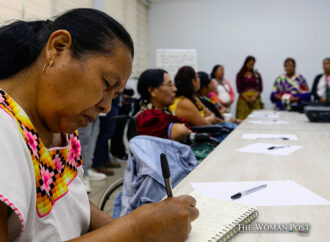More than publicly punishing rapists, the Gulabi Gang has influenced the creation of legislation that protects the rights of women in India.
Is there a gang of women who beat men? The answer is "yes" and Its name is Gulabi Gang.
Seventeen years ago, a group of women was formed in India who had experienced humiliation and suffering due to abuse or forced early marriages. They decided to seek justice for themselves and others in vulnerable situations.
Read more content like this at: thewomanpost.com
Uttar Pradesh, in northern India, is the birthplace of the Gulabi Gang, consisting of women of various ages who grew tired of injustices. Its founder, Sampat Pal Devi, explains that although some label them as a gang, the group operates more like a band seeking the justice that, from their perspective, traditional legal means fail to deliver.
Minor offenders receive a talk when they exhibit inappropriate behavior towards women, and abusive adults are publicly shamed if they refuse to change their attitude. If this happens, Sampat explains, the women of the Gulabi Gang take bamboo lathis (a weapon comparable to a thin but strong broomstick) and punish the men.
Dressed in Pink
The ages of the Gulabi Gang members ranged from 40 to 60 years in the beginning. They are distinguished by wearing saris (traditional Hindu attire) of a bright and vibrant pink color. Less than 30 activists were the pioneers of this curious group that decided to challenge male dominance in the Bundelkhand district, where poverty and mistreatment of women prevail.
Traditionally, Uttar Pradesh has been governed by measures that undermine women's rights, making them victims of illiteracy, forced child labor, female feticide, dowry demands, and caste divisions. There have been countless women in the past who preferred suicide over accepting mistreatment.
Fortunately, in 2005, the Indian Parliament enacted the Domestic Violence Act, which classifies economic, physical, verbal, sexual, and emotional abuse as crimes. However, the Gulabi Gang, which had 400,000 activists by the end of 2022, has continued its fight by accepting younger women. Today, they also work towards other purposes, such as advocating for government compensation for women who have lost their crops, pensions for widows left without spousal support, girls' education, and the establishment of schools.
Yoy can also read: Are Feminist and Feminazis Products Of a Fasion?
Political involvement
While the Gulabi Gang has achieved undeniable successes against established policies that do not favor women, its activists prefer to continue acting based on their original concept through street protests and increasing the number of women in small district-level groups. The leaders believe that the results of the work by women from lower castes, such as the Dalit, who have gained political power, have been dismal.
Thirteen years ago, a law was enacted in India reserving 33% of parliamentary seats for women who wish to participate in politics. However, the leaders of the Gulabi Gang believe that the results of their grassroots activism are immediate, and that is why they continue to wave the flag of local justice through constant vigilance without establishing formal ties with governmental institutions.
The Gulabi Gang adheres to a code that they strictly follow: if a woman who has been abused reports her case to the police and no positive outcome is achieved, the gang takes action against the aggressor.
The results of years of activism in favor of women in their region have earned them the sympathy of many supportive men, and the police acknowledge that their work has helped resolve a greater number of family problems. Others consider their vigilante justice as incorrect, contradicting the teachings of Mahatma Gandhi. However, it is a fact that Gulabi's public punishments have deterred male aggression.
Sampat Pal Devi, the founder of the Gulabi Gang, who now works behind the scenes, was subjected to violence at home for a long time. Witnessing a man beating his wife in a public space prompted her to take action, defying the established order. Her first step was to convince other women to teach the man a lesson with the impact of their lathis, and they have acted accordingly ever since.
In an interview with the newspaper El País, the founder of the Gulabi Gang said, "The pink color we wear signifies revolution. We fight against prevailing male domination, against fathers who deny their daughter education and arrange their marriages as children. We help abused women”.

























Leave a Comment
Your email address will not be published. Required fields are marked with *